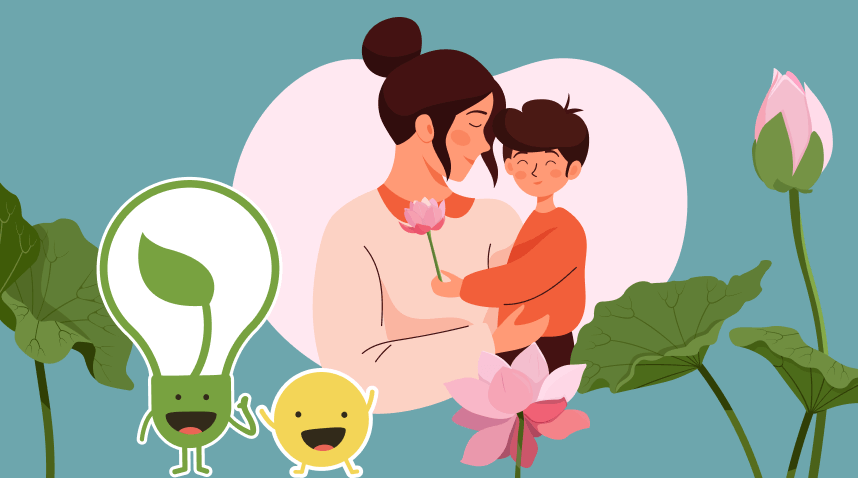TLDR: The month of May provides the opportunity to express our gratitude and appreciation to the Buddha and Mothers in our lives. Stories can be a good entryway to be inspired and strengthen our faith in practicing Buddha’s teachings.
May is a special month for many Buddhists for we usually, but not always celebrate Vesak. Fun fact: Vesak was celebrated in June 2023 – impermanence is everywhere. It is also when we celebrate the sacrifice and dedication of our mothers and Mother figures in our lives by celebrating Mother’s Day. Let us explore the theme of gratitude in May.
Stories & Facts Blend
During the Vesak celebration, we would encounter many stories of the Buddha, including the Buddha having superior physical attributes that are distinctive from the average human beings and, supernatural powers.
Given the Buddha’s focus on teaching the Dhamma and not veneration of the Buddha as the teacher, there are limited descriptions of the Buddha’s physical features and no image of the Buddha until six centuries after the Buddha’s parinibbāna. Hence, we need to take a moment to critically evaluate some of the Buddha’s stories and even teachings, for humans tend to glorify and create stories of respected teachers of the past.
Here, it would be prudent to remember the Buddha’s words to the Kālāmas, who wanted the Buddha to clarify how to ascertain which teachers and teachings are to be followed, the Buddha encourages everyone to discover for themselves what is true and skillful.
Let us not assume all that is written and shared today, are teachings directly attributable to the Buddha.
Moving across 3 faiths in Buddhism

Over the years of practicing Buddhism, I have moved across the 3 Faiths in Buddhism, from ‘Blind’ Faith, to Knowledge-based Faith, to Practice-based Faith. Hence, I see stories of veneration to our supreme teacher, the Buddha, as important to inspire faith for Buddhists, from all walks of life and levels of understanding in Buddhism (Check out Sis Sylvia Bay’s book on Faith – Saddhā here).
Queen Maya, the birth mother of Gautama Buddha, holds a special place in Buddhism because she bore and gave birth to our teacher, the Buddha.
There are tales about her dreams of being pregnant with the Buddha-to-be and other stories that should be taken with a pinch of salt. If it helps to inspire faith in us to practice Buddhism, that’s good, but we should strive to understand the Buddha’s true teachings better.
Repaying debt

The Buddha shared that it is hard to repay the debt of one’s parents in life, no matter how much we sacrifice. However, sharing the Dhamma would be a way to repay our parents.
After Buddha’s Enlightenment, Buddha travelled back home to teach and inspire the family to gain the wisdom of the Buddha’s teaching. For us who still have our parents around, let us inspire them to learn the true Dhamma.
It is good to pay our respects and to say words of appreciation to our benefactors, at the point of receiving the act of kindness, yet better still if we can continue to remember and repay their contributions in the future.
My mother always reminds me to check in and express my appreciation to the many ladies (and men) who have supported me across time and places.
We may be ever-connected digitally these days, but the reality is we are also facing a Loneliness Pandemic, even before the COVID-19 pandemic that forces us to isolate and hunker down at home.
Let us do our part, in extending our kindness and compassion, to help those who may be lonely, by reaching out and connecting meaningfully with our family and friends. The practice of gratitude is a form of spiritual practice as well, and it is beneficial to others and us.
The Second Mother
Queen Mahapajapati Gautami was the aunt (Queen Maya’s sister) and stepmother of Gautama Buddha, who cared for and brought up the Buddha after the passing of Queen Maya.
She has her child, but her love and compassion for the Buddha, who had lost his mother at such a young and tender age, moved her to care for the Buddha, just like her only child.
The chants of the Karaniya Mettā Sutta (Buddha’s Word on Loving-Kindness) include the following:
Whatever living beings there may be;
Whether they are weak or strong, omitting none…
To me, it is important for a layperson like me who counts the Mettā Sutta as one of my favourite chants, to not just chant it or to engage the Dhamma intellectually, but the Dhamma is something that can be brought to life, to be practised in our daily life, in supporting those who are challenged in myriad ways in the world.
In closing, I would like to express my heartfelt appreciation and gratitude to my mother, Madam Chui Yuet Peng, and the many motherly figures in my life for their kind patience, and generosity in supporting me.
My wish for Mother’s Day month, and hopefully beyond that, is that we can be inspired to be like the Buddha, to repay our mother’s contribution to our life, in small or big ways, whatever is suitable and appropriate within our means.
In addition, we have an important role in helping to empower and support those who are “weak” (socially discriminated against) in our lives, be it gender or sexual orientation (Hint: Pride Month is celebrated in June).
Sukhi hontu – May you be well and happy.
Wise Steps:
- Reflect on the stories of the Buddha that inspire your faith and practice in Buddhism. As we grow up we discover that some of the Buddha’s fables cannot be true, does it affect our practice in any form or way?
- For Mother’s Day, choose to do a simple gesture to say thanks to your Mother, or Mother figures in your life. Next, try to keep it going for the rest of the months till the next Mother’s Day.
- Take lessons to explore the original Buddha’s teachings. My 5 years learning journey taking up a Diploma, Bachelor’s, and Master’s degree in Buddhist Studies and Pali Language from the Buddhist and Pali College of Singapore helped me clarify doubts and myths about Buddhism and strengthened my faith to practice Buddhism diligently.


